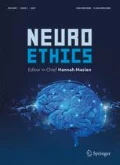Abstract
Among psychiatric conditions, delusions have received significant attention in the philosophical literature. This is partly due to the fact that many delusions are bizarre, and their contents interesting in and of themselves. But the disproportionate attention is also due to the notion that by studying what happens when perception, cognition, and belief go wrong, we can better understand what happens when these go right. In this paper, I attend to delusions for the second reason—by evaluating the epistemology of delusions, we can better understand the epistemology of ordinary belief. More specifically, given recent advancements in our understanding of how delusions are formed, the epistemology of delusions motivates a proper functionalist account of the justification of belief. Proper functionalist accounts of the justification of belief hold that whether a belief is justified is partly determined by whether the system that produces the belief is functioning properly. Whatever pathology is responsible for delusion formation, restoring it to its proper function resolves the epistemic condition, an effect which motivates proper functionalism.
Similar content being viewed by others
Notes
This is not to say that delusional beliefs are lacking entirely epistemic value. Recently, some authors have argued that monothematic delusions are epistemically innocent, which is an epistemic property of states that are epistemically faulty but nevertheless confer some epistemic benefit [3, 22, 26].
John Turri argues that doxastic justification explains propositional justification, which is contrary to the orthodox view that the order of explanation goes the other way [27]. Even so, his view wouldn’t permit an irrationally held justified belief.
Thanks to an anonymous referee for this example.
I adopt ‘proper function’ rather than perhaps a more common terminology, ‘etiological function,’ out of convenience, as the epistemological theory (i.e., proper functionalism) adopts this language.
This is obviously true for accounts such as reliabilism or proper functionalism. But even internalist accounts propose some grounding condition on the belief.
References
Bayne, Tim, and Elisabeth Pacherie. 2005. In Defence of the doxastic conception of delusions. Mind & Language 20. John Wiley & Sons, ltd (10.1111): 163–188. doi:https://doi.org/10.1111/j.0268-1064.2005.00281.x.
Bortolotti, L. 2010. Delusions and other irrational beliefs. International Perspectives in Philosophy & Psychiatry. OUP Oxford.
Bortolotti, Lisa. 2016. Epistemic benefits of elaborated and systematized delusions in schizophrenia 67: 879–900. doi:https://doi.org/10.1093/bjps/axv024.
Maher, B A. 1974. Delusional thinking and perceptual disorder. Journal of individual psychology 30. United States: 98–113.
Coltheart, Max, Peter Menzies, and John Sutton. 2010. Abductive inference and delusional belief. Cognitive Neuropsychiatry 15: 261–287. https://doi.org/10.1080/13546800903439120.
Mckay, Ryan. 2012. Delusional inference 27: 330–355.
Macpherson, Fiona. 2017. The relationship between cognitive penetration and predictive coding. Consciousness and Cognition 47. The author: 6–16. doi:https://doi.org/10.1016/j.concog.2016.04.001.
Clark, Andy. 2013. Whatever next? Predictive brains, situated agents, and the future of cognitive science. Behavioral and Brain Sciences 36: 181–204. https://doi.org/10.1017/S0140525X12000477.
Corlett, P.R., J.R. Taylor, X.J. Wang, P.C. Fletcher, and J.H. Krystal. 2010. Toward a neurobiology of delusions. Progress in Neurobiology 92: 345–369. https://doi.org/10.1016/j.pneurobio.2010.06.007.
Reznek, Lawrie. 1987. The nature of disease. Routledge & Kegan Paul.
Beddor, Bob. 2015. Process reliabilism’s troubles with defeat. The Philosophical Quarterly 65: 145–159. https://doi.org/10.1093/pq/pqu075.
Siegel, Susanna. 2017. The rationality of perception. Oxford University Press.
Huber, M., E. Kirchler, M. Karner, and R. Pycha. 2007. Delusional parasitosis and the dopamine transporter. A new insight of etiology? Medical Hypotheses 68. Churchill Livingstone: 1351–1358. doi:https://doi.org/10.1016/J.MEHY.2006.07.061.
Ermakova, Larisa Alexandrovna, Sergey Andreevich Nagorny, Elena Yurievna Krivorotova, Natalia Yurievna Pshenichnaya, and Olga Nikolaevna Matina. 2014. Dirofilaria repens in the Russian Federation: current epidemiology, diagnosis, and treatment from a federal reference center perspective. International Journal of Infectious Diseases 23. Elsevier: 47–52. doi:https://doi.org/10.1016/J.IJID.2014.02.008.
Plantinga, Alvin. 1993. Warrant and proper function. New York: Oxford University Press. https://doi.org/10.1093/0195078640.001.0001.
Bergmann, M. 2006. Justification without awareness: A defense of epistemic externalism. Oxford Scholarship Online. Philosophy Module. Clarendon Press.
Neander, Karen. 1991. The teleological notion of ‘function.’ Australasian Journal of Philosophy 69. Routledge: 454–468. doi:https://doi.org/10.1080/00048409112344881.
Neander, Karen. 1991. Functions as selected effects: The conceptual Analyst’s defense. Philosophy of Science 58. [University of Chicago Press, philosophy of science association]: 168–184.
Millikan, Ruth Garrett. 1989. In Defense of Proper Functions. Philosophy of Science 56. The University of Chicago Press: 288–302. doi:https://doi.org/10.1086/289488.
Cummins, Robert. 1975. Functional analysis. The Journal of Philosophy 72: 741. https://doi.org/10.2307/2024640.
Nanay, Bence. 2010. A modal theory of function The Journal of Philosophy 107: 412–431.
Bortolotti, Lisa. 2015. The epistemic innocence of motivated delusions q. Consciousness and Cognition 33. Elsevier Inc.: 490–499. doi:https://doi.org/10.1016/j.concog.2014.10.005.
McKay, Ryan T, and Daniel C Dennett. 2009. The evolution of misbelief. The Behavioral and brain sciences 32. England: 461–493. doi:https://doi.org/10.1017/S0140525X09990975.
Friston, Karl, James Kilner, and Lee Harrison. 2006. A free energy principle for the brain 100: 70–87. doi:https://doi.org/10.1016/j.jphysparis.2006.10.001.
Friston, Karl. 2010. The free-energy principle : A unified brain theory ? 11. Nature publishing group: 127–138. doi:https://doi.org/10.1038/nrn2787.
Sullivan-Bissett, Ema. 2018. Monothematic delusion : A case of innocence from experience monothematic delusion : Philosophical Psychology 31. Routledge: 920–947. doi:https://doi.org/10.1080/09515089.2018.1468024.
Turri, John. 2010. On the relationship between propositional and doxastic justification. Philosophy and Phenomenological Research 80: 312–326.
Author information
Authors and Affiliations
Corresponding author
Additional information
Publisher’s Note
Springer Nature remains neutral with regard to jurisdictional claims in published maps and institutional affiliations.
Rights and permissions
About this article
Cite this article
Crutchfield, P. Delusion, Proper Function, and Justification. Neuroethics 14, 113–124 (2021). https://doi.org/10.1007/s12152-020-09429-5
Received:
Accepted:
Published:
Issue Date:
DOI: https://doi.org/10.1007/s12152-020-09429-5



